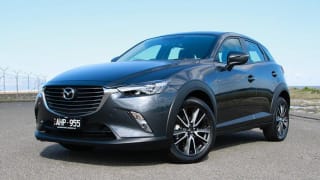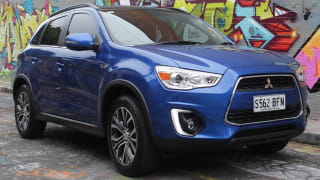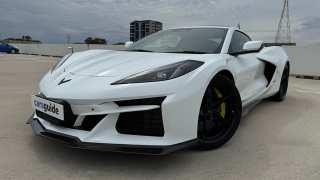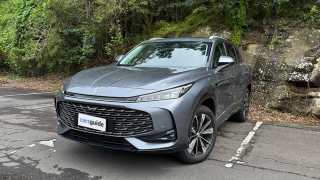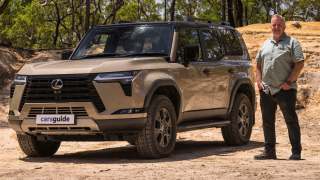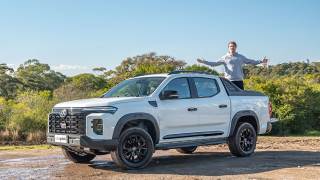Peter Anderson road tests and reviews the Nissan Qashqai Ti with specs, fuel consumption and verdict.
The name Qashqai might not be very familiar to you but if I say Dualis, I reckon I'll get a flicker of recognition. Only Japanese and Australian cars were badged Dualis while the rest of the world had almost eight years to get used to this impenetrable consonant cluster.
MORE: Read the full Nissan Qashqai 2017 review
The name doesn't seem to have bothered anybody (we're used to brand names starting with a Q after all), with the Qashqai picking up where the Dualis left off, moving just over 1000 every month during 2016.
Occupying the same market segment as Mazda's all-conquering CX-3 and our long-term Honda HR-V, the Qashqai is the biggest in its class and, out of these three, the most expensive. Dig into the specification list and you'll see that more dollars means more things. The question is, are those things enough to tempt you?
Price and features
The Qashqai petrol range kicks off with the ST manual ($25,990) and CVT automatic ($28,490) and ends with the Ti manual ($34,490) and automatic ($36,990).
The higher price is partially justified by a number of features not available on the immediate competition.
Our car was the automatic 2.0 petrol Ti. For your $36,990 you get 19-inch alloy wheels, a six-speaker stereo, dual-zone climate control, around-view cameras, reversing camera, keyless entry and start, front and rear parking sensors, cruise control, sat nav, automatic LED headlights, heated and electrically operated front seats, leather interior (some real, some not), auto parking, space-saver spare, huge sunroof and auto wipers.
The higher price is partially justified by a number of features not available on the immediate competition, some obvious, some under the skin. The only option is premium paint, which at $495 is reasonable, however out of eight colours only two are at no-cost (including the Ivory Pearl white of our car) and the Mazda only has two optional paint colours at a very reasonable $250.
Practicality
The Qashqai is at the chunkier end of the small SUV class. At 4.4 metres, it's longer than any of them.
The interior is well thought-out, with four cupholders (two front and two rear) and bottle holders in each door for a total of four, although you're restricted to bottles of around 500ml. The console's storage bin is rather tall and has a circular cut-out moulded into the base, so you can get a wine bottle or gigantic slurpee in there and have reasonable confidence of either item surviving unscathed. The Ti also has a removable tray that fits in the top of the bin which takes coins, cards and other detritus.
The clever boot is 430 litres' worth, bested only by Honda's HR-V and even then by a piffling seven litres. Either side of the space is a cubby hole with stretchy straps that seem tailor-made for bottles, so that makes up for the smaller door-bound bottle holders.
It really does look bigger than the rest of the small SUV class by some margin, but that's an illusion brought on by the big wheels.
Like the Mazda CX-3, the boot floor is removable but in the Qashqai's comes in two sections. You can either store slim valuables beneath these sections or you can remove the sections for a deeper boot. Without the falsie, you do have to lift things over the loading lip, which is otherwise flush.
The glove box fits the hefty owner's manual and there is a space under the climate control where even bigger phones can live.
The rear seats are roomy enough for most folks, but the lack of rear air vents is a shame and if you've got that long sunroof open, they'll be at risk of cooking back there without the fan on high.
Three kids could cheerfully spend time on the rear bench, but three adults would be a stretch. The front seats are reasonably comfortable and adjustable but are a little over-stuffed.
Design
Sometimes when you see a Qashqai on the road - particularly in white - you have to check it isn't an X Trail, at least when it's coming towards you. Nissan has deliberately styled them as a pair, it seems, to try and suggest that when you've outgrown a Qasqhai, an X Trail will slot straight into your life. They certainly looks similarly-sized, which they really aren't. The rear end of the Qasqhai is its own, however, and is quite inoffensive.
Inside is almost entirely conventional to the point of dull. That's not a bad thing.
It really does look bigger than the rest of the small SUV class by some margin, but that's an illusion brought on by the big wheels (particularly on the Ti model with its 19s) and a little extra height as well as a window line that doesn't play any tricks.
Inside is almost entirely conventional to the point of dull. That's not a bad thing, you're buying the Qashqai for space and comfort. If you want a clever, inventive interior, the HR-V is for you. There's plenty of light in here, though, courtesy of big windows, big windscreen and the full length sunroof (when the blind is wound back).
Engine and transmission
The Qashqai is available with two engines, but the Ti has just one - the 2.0 litre four cylinder naturally-aspirated. Producing 106kW/200Nm, those numbers match almost every other car in the segment. You can choose either a six-speed manual or the CVT (continuously variable transmission) we - and almost every Qashqai buyer - has. A 0-100km/h time isn't quoted, but overseas tests suggests around 10 seconds.
One of the reasons you'll pay a bit more for the Qashqai is that you'll get in and immediately feel the difference between it and the competition.
The Qashqai's towing capacity is rated at 720kg for unbaked trailers and 1200kg for those with brakes.
Fuel consumption
Nissan claims 6.9L/100km on the combined cycle. We had a good long go with the Qashqai over Sydney's weird Christmas/New Year period, coming up against streets you could fire a cannon down or inexplicably clogged arterial roads. We averaged 11.2L/100km. Tellingly, the 1457kg car has no stop-start to cut consumption.
Driving
One of the reasons you'll pay a bit more for the Qashqai is that you'll get in and immediately feel the difference between it and the competition. Specifically, the ride is excellent. That's partly down to the multi-link rear suspension (its competitors go with cheaper torsion beams), a more complex but better solution.
It handles very tidily, verging on fun.
The Qashqai corners flat but rides the bumps a lot better than most, especially for those sitting in the back. Those nasty rubber speed bumps bolted into the concrete in shopping centres are dispatched with ease, whereas its competitors skip and thump over them.
The same goes with the overall handling - it handles very tidily, verging on fun.
Except. The CVT allied with the less than exciting power outputs of the petrol engine mean that the pace is leisurely. The Qashqai isn't the driver's pick of the segment, but it's hardly the kind of car revheads buy in the first place.
Safety
Standard passive and active safety tech includes six airbags, ABS, stability and traction controls, two ISOFIX points, lane departure warning, forward collision warning, and blind spot detection.
The Qashqai was awarded a five star safety rating in July 2014, the maximum score available.
Ownership
Nissan's standard new car warranty runs for three years/100,000km and you can extend the warranty if you like giving your dealer more money, and are confident of not exceeding the kilometre limit. Roadside assist comes as part of the warranty package.
Nissan offers capped price servicing which it calls 'Service Certainty'. As the Ti is a petrol, you'll pay $3684 across 12 services, averaging $307 per service. Petrol Qashqais are an average of $90 cheaper per service than the diesel models.
